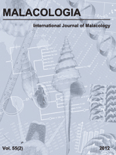
MALACOLOGIA
Scope & Guideline
Advancing the Frontiers of Malacological Research
Introduction
Aims and Scopes
- Taxonomy and Systematics:
A core area of the journal, focusing on the classification, identification, and evolutionary relationships of mollusk species. This includes both contemporary and fossil taxa, providing insights into their phylogeny and biogeography. - Ecology and Behavior:
Research in this area examines the ecological roles of mollusks in various environments, including their interactions with other species, feeding behaviors, and adaptations to different habitats. - Conservation Biology:
The journal emphasizes studies related to the conservation of mollusk species, particularly those that are threatened or endangered. This includes research on habitat preservation, population dynamics, and the impacts of environmental changes. - Genetics and Genomics:
MALACOLOGIA publishes research involving molecular techniques to explore genetic diversity, population structure, and evolutionary processes in mollusks, contributing to a deeper understanding of their biology. - Physiology and Morphology:
This area involves the study of the anatomical and physiological characteristics of mollusks, including adaptations to their environments and responses to ecological pressures.
Trending and Emerging
- Molecular and Genetic Research:
There is a noticeable increase in studies employing molecular techniques to investigate genetic diversity and population structure among mollusks. This trend underscores the importance of understanding genetic factors in conservation and evolutionary biology. - Impact of Climate Change:
Recent publications have highlighted the effects of climate change on mollusk species, including shifts in distribution and physiological responses. This emerging theme is critical for anticipating future ecological challenges and informing conservation strategies. - Integrated Taxonomic Approaches:
There is a growing trend towards using integrative methodologies that combine morphological, molecular, and ecological data to resolve taxonomic ambiguities. This reflects a shift towards more holistic understandings of species boundaries and relationships. - Ecological Interactions and Ecosystem Services:
Research exploring the roles of mollusks in ecosystems and their contributions to ecosystem services is on the rise. This theme is increasingly relevant in discussions about biodiversity and ecosystem health. - Conservation Strategies and Management:
A focus on practical conservation strategies and management practices for mollusk populations, particularly in light of anthropogenic pressures, is emerging as a significant theme, indicating the journal's commitment to applied research.
Declining or Waning
- Historical Taxonomy:
Research focusing on historical taxonomy and the contributions of early malacologists has seen a decline. This may be due to a shift towards contemporary ecological and genetic studies that provide immediate relevance to current conservation issues. - Morphological Studies:
While still important, traditional morphological studies of mollusks are becoming less frequent as researchers increasingly employ molecular techniques. This trend reflects a broader movement in biological sciences toward genomics and molecular biology. - Invasive Species Research:
Although still relevant, the frequency of studies specifically addressing invasive mollusk species has decreased. This may be attributed to growing interest in broader ecological impacts and management strategies rather than species-specific investigations.
Similar Journals

ZOOLOGICHESKY ZHURNAL
Delving into the dynamics of ecosystems and species behavior.Zoologichesky Zhurnal, a prominent journal in the field of Ecology, Evolution, Behavior and Systematics, has been a vital publication since its inception in 1950. Published by MAIK Nauka-Interperiodica in the Russian Federation, this journal has established a notable reputation in disseminating scientific research and advancing knowledge in zoology. With its coverage spanning from 1950 to 2023, and a specific convergent focus during 1982-1983, this journal contributes significantly to the ecological and evolutionary sciences, even though it currently holds a Q4 classification in the 2023 category quartiles, indicating its niche positioning among peers. Researchers and students engaged in the study of biological sciences, particularly those interested in the dynamics of ecosystems, behavior of species, and evolutionary processes, will find valuable insights and original research articles within its pages. While access to this esteemed journal is not open, it remains an essential resource for those seeking to deepen their understanding of zoological sciences.

NAUTILUS
Where Aquatic Science Meets Scholarly ExcellenceNAUTILUS is a distinguished journal published by the Bailey-Matthews Shell Museum, dedicated to advancing the understanding of aquatic sciences as well as ecology, evolution, behavior, and systematics. With an ISSN of 0028-1344, NAUTILUS has played a significant role in the scholarly community from its inception, with publication converged between 1996 to 2015 and 2017 to 2024. Although currently categorized as Q4 in Aquatic Science and Ecology, Evolution, Behavior and Systematics for 2023, the journal has a reputation for publishing high-quality research that contributes to the broader scientific discourse. Researchers and students alike can benefit from the insights provided by NAUTILUS, which remains committed to exploring the intricate relationships within aquatic ecosystems. Its editorial management, led by Dr. José H. Leal, ensures rigorous peer review and academic excellence, making it a crucial resource for those dedicated to discovering the complexities of aquatic and ecological research.
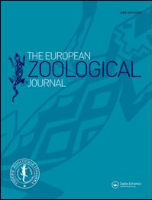
European Zoological Journal
Bridging the Gap Between Research and Ecological SolutionsEuropean Zoological Journal, published by Taylor & Francis Ltd, is an esteemed open-access publication dedicated to advancing the exciting field of zoology. Since its inception in 2017, this journal has progressively established itself as a vital resource for researchers, professionals, and students alike. With its Q2 ranking in Animal Science and Zoology as of 2023, the journal ranks in the 69th percentile among its peers, showcasing its influence and contribution to the discipline. The journal’s broad scope covers a wide range of topics within zoology, aiming to foster an understanding of animal biology and conservation efforts. As an open-access journal, it not only enhances the dissemination of knowledge but also encourages collaborative research across global communities. Situated in the United Kingdom, the European Zoological Journal invites submissions that contribute to the evolving discourse in animal sciences, and endeavors to support the scientific community in addressing pressing ecological challenges.
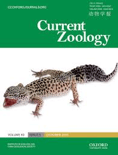
Current Zoology
Elevating Knowledge in the Dynamic Field of ZoologyCurrent Zoology, published by Oxford University Press, is a leading open-access journal dedicated to advancing the field of zoology and animal science since its establishment in 2009. With an impressive Q1 ranking in Animal Science and Zoology as of 2023, the journal maintains a prominent position within the academic community, supported by a ranking of #138 out of 490 in Scopus. Current Zoology serves as a vital platform for researchers, professionals, and students, showcasing high-quality research that spans a broad array of topics within the domain of zoology. This journal is characterized by its rigorous peer-review process, ensuring the dissemination of credible and impactful findings that contribute to the understanding of animal biology and conservation efforts. The open-access model enhances accessibility, allowing a wider audience to engage with the pivotal research being conducted in this dynamic field. Processing all manuscripts in an efficient manner and featuring articles that push the boundaries of current knowledge, Current Zoology is your gateway to explore innovative discoveries and trends in zoology.
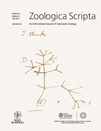
ZOOLOGICA SCRIPTA
Championing impactful studies in ecology and behavior.Zoologica Scripta, published by Wiley, stands as a distinguished journal within the fields of Animal Science and Zoology, Ecology, Evolution, Behavior and Systematics, Genetics, and Molecular Biology. With its inception dating back to 1971 and a convergence year extending to 2024, this journal consistently provides a platform for high-quality research, earning a Q1 ranking in two key categories and solid performance in additional fields, as evidenced by its significant Scopus rankings and impressive percentiles. Notably, it ranks 36 out of 490 journals in Animal Science and Zoology, placing it in the 92nd percentile. While Zoologica Scripta operates under a traditional access model, its rigorous peer-review process ensures that only the most impactful studies make their way into its pages. With a focus on advancing our understanding of biodiversity and evolutionary processes, this journal is indispensable for researchers, professionals, and students committed to the ongoing exploration of animal sciences and ecological studies.

ANIMAL BIOLOGY
Pioneering Studies in the Dynamic World of Animal BiologyANIMAL BIOLOGY is a distinguished journal published by BRILL, focusing on the dynamic fields of Animal Science and Zoology, as well as Ecology, Evolution, Behavior, and Systematics. With an ISSN of 1570-7555 and an E-ISSN of 1570-7563, this quarterly journal serves as a pivotal platform for researchers and professionals seeking to contribute to the understanding of animal biology across diverse ecological contexts. The journal is recognized with a 2023 Scopus ranking of #234 out of 490 in the Animal Science and Zoology category, placing it within the 52nd percentile, alongside a rank of #409 out of 721 in Ecology, marking a solid contribution to the field. Although it currently holds a Q3 quartile in both categories, its commitment to quality research and novel insights continues to bolster its significance within the academic community. The open access option coupled with its publication history from 2003 to 2024 ensures a wide dissemination of knowledge, drawing in a global audience of researchers, professionals, and students eager to explore the intricacies of animal biology. By promoting high-quality discussions and innovative studies, ANIMAL BIOLOGY plays an essential role in advancing the understanding of life sciences and the evolution of biodiversity.
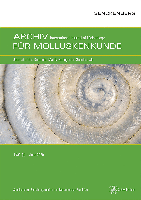
ARCHIV FUR MOLLUSKENKUNDE
Connecting Researchers in the World of MollusksARCHIV FUR MOLLUSKENKUNDE, published by E SCHWEIZERBARTSCHE VERLAGSBUCHHANDLUNG, is a premier journal dedicated to the study of mollusks, covering a broad spectrum of topics from taxonomy and ecology to conservation and biodiversity. With its commitment to advancing knowledge and fostering collaboration within the malacological community, this journal serves as an essential resource for researchers, professionals, and students alike. Though it is not currently operated under an open-access model, it provides valuable insights and the latest findings in the field, making it indispensable for those involved in mollusk research. Scholars can access the journal's rich repository of articles, ensuring their work remains at the forefront of scientific inquiry. The journal operates out of Stuttgart, Germany, further emphasizing its European scholarly tradition in the environmental and biological sciences.

Journal of Asia-Pacific Biodiversity
Advancing ecological knowledge for a sustainable Asia-Pacific.Journal of Asia-Pacific Biodiversity is an esteemed academic journal dedicated to advancing knowledge in the dynamic fields of biodiversity, ecology, and related biological sciences. Published by the NATL SCIENCE MUSEUM & KOREAN NATL ARBORETUM, this journal serves as a crucial platform for researchers and professionals seeking to explore and disseminate impactful findings pertaining to the Asia-Pacific region's rich biological diversity. With an E-ISSN of 2287-9544, the journal is indexed in leading databases, achieving a Q3 ranking across various categories in 2023, including Animal Science and Zoology, Ecology, Insect Science, and Plant Science. It strives to unite scientific research across disciplines, thus fostering a deeper understanding of ecological dynamics and conservation efforts within this vital region. The journal operates with an open access policy, ensuring that findings are widely available for widespread benefit, making it an essential resource for students, researchers, and environmental practitioners alike. Since its initiation in 2013 and continuing through 2024, the journal remains committed to delivering high-quality, peer-reviewed articles that contribute significantly to the global conversation on biodiversity and ecosystem sustainability.
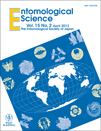
ENTOMOLOGICAL SCIENCE
Pioneering Research in Insect ScienceENTOMOLOGICAL SCIENCE, published by WILEY, stands at the forefront of research in the field of entomology, focusing on the intricate relationships between insects and their environments. With its ISSN 1343-8786 and E-ISSN 1479-8298, this esteemed journal, based in the United States, has been serving the scientific community since 2005. As a Q3 journal in both Ecology, Evolution, Behavior and Systematics and Insect Science, it presents vital peer-reviewed articles that advance our understanding of insects and their ecosystems. With a Scopus rank of 85/181 in Insect Science, the journal not only reinforces the importance of insect study but also serves as an essential resource for researchers and professionals seeking to explore and disseminate knowledge in this dynamic field. Although it does not offer Open Access options, its scholarly contributions are invaluable for those invested in ecological research and entomological perspectives—making it a must-read for aspiring and established scientists alike.

ANNALES ZOOLOGICI FENNICI
Illuminating the Dynamics of Animal ScienceANNALES ZOOLOGICI FENNICI, published by the Finnish Zoological Botanical Publishing Board, is a prominent scientific journal dedicated to advancing the fields of Animal Science, Zoology, Ecology, Evolution, Behavior, and Systematics. Based in Finland and serving an international audience, this journal has been an essential resource since its inception in 1974, offering valuable insights into biodiversity, conservation, and ecological dynamics. While it holds a respectable Q3 quartile ranking across several relevant categories in 2023, its impactful contributions to the scientific community continue to promote critical discussions and foster research collaborations. Although the journal is not currently open access, its robust indexing in Scopus and recognition within the academic community underscore its significance. As a researcher, professional, or student, engaging with the ANNALES ZOOLOGICI FENNICI not only enriches your knowledge but also aligns you with the forefront of zoological research and conservation studies.